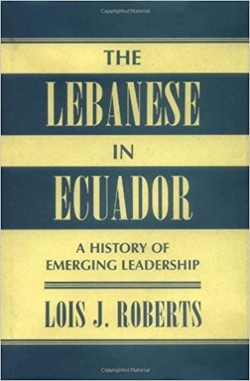The same wave of immigrants that brought the first Levantines to the United States also brought them to other countries in the Americas. (Sometimes inadvertently: Shafik Handal, the Salvadoran leader, once told how his grandfather had boarded a ship for "America" and was dismayed to find himself not in the United States but in El Salvador). The first Levantine immigrants to Ecuador arrived around 1850 and larger numbers reached there in the 1880s and 1890s, nearly all of them Christians.
As in the United States, many of the early immigrants peddled merchandise and then graduated to stores proper. There, too, the men arrived first and only later did the women join them. They tended to settle in Ecuador's commercial capital, Guayaquil. They suffered prejudice, worked exceedingly hard, and invested nearly all in their children (whom they gave such interesting, ambitious names as Averroes and Avicena).
 Roberts' excellent history traces the ascent of the Lebanese community from these humble beginnings to its amazingly high-flying current status, one that involves both business and public life. The first major player in politics was Assad Bucaram Elmhalim (b. 1916); many others followed. In the run-up to the 1996 presidential elections, all of the three most likely candidates were of Lebanese extraction: Vice President Alberto Dahik Garzozi; the mayor of the capital city, Jamil Mahuad Witt; and former governor Jaime Nebot Saadi. But none of these men won: instead, victory went to a fourth Lebanese, Abdala Bucaram Ortiz, another former mayor. But this flamboyant figure was impeached and a year later was succeeded by Mahuad. Although a hard-working and responsible figure, Mahuad in January 2000 was also forced out of office.
Roberts' excellent history traces the ascent of the Lebanese community from these humble beginnings to its amazingly high-flying current status, one that involves both business and public life. The first major player in politics was Assad Bucaram Elmhalim (b. 1916); many others followed. In the run-up to the 1996 presidential elections, all of the three most likely candidates were of Lebanese extraction: Vice President Alberto Dahik Garzozi; the mayor of the capital city, Jamil Mahuad Witt; and former governor Jaime Nebot Saadi. But none of these men won: instead, victory went to a fourth Lebanese, Abdala Bucaram Ortiz, another former mayor. But this flamboyant figure was impeached and a year later was succeeded by Mahuad. Although a hard-working and responsible figure, Mahuad in January 2000 was also forced out of office.
Apr. 27, 2004 update: For more on this general topic, see my weblog, "Arab Immigrants in Latin American Politics."